That the instinct for bread labor, the very antithesis of war, is more primitive and more imperative than the desire to war is one of the self-evident simplicities over which one pauses in Jane Addams’ book, “Bread and Peace in War Time.”
“These Russian soldiers said to their captains ↑captors↓ (in Austria Hungary) now that spring had come they wanted to get back to work and so would like to be made prisoners at least long enough to put seed into the ground. They wished to put seed into the ground irrespective of its national or individual ownership.”
She recalls one evening when she sat in the garden at Yasnaya Polyana and heard Tolstoy predict that Russian peasants in their permanent patience, their insatiable hunger for bread-labor, might at lease last make war impossible to an entire agricultural people, who “do not change their natures when they shed their blouses and put on the Czar’s coat.”
Miss Addams analyzes at length the attempt of the Russian soldiers to lay down their arms and to return to the land. Rather, concerning that attempt she proposes questions which were not generally raised during the war when “all humanly tangible distinctions between normal and abnormal disappear” and [page 2] the moral implications of the Russian attempt were not regarded. The profound political changes and democratic reconstruction with the Allied nations expected to follow the war “when the animalistic forces which are inevitably encouraged as a valuable asset in warfare should once more be [relegated] to a subordinate place,” may, she suggests, have begun to take place with that Russian demand to return to the land and to bread-labor, that “naive attempt on the part of the Russian peasants to achieve democracy without war.”
“Did the Russians, for one golden moment, offer a way out? Or was the present outcome inevitable -- *Brest-[Litovsk], the remarkable terms in the Versailles Treaty, [Trotsky]’s huge army, much of the present confusion in the world?”
She reminds us, that twice before, in 1815 and in 1899, at the hands of Alexander ↑I↓ and of Nicholas ↑II↓, Russia has at a crucial moment tried to initiate a machinery, which should secure permanent peace for all nations. The third effort she names as “the spontaneous effort of the Russian revolutionist to break through the belief that any spiritual good can be established through the agency of large masses of men fighting other large masses and through their naive attempt to convert individual soldiers. The string of Russian soldiers talking to their recent enemies stretched from the Baltic Sea to the Corpathian mountains. These simple men assumed that men wished to labor in the soil and did not wish to fight, while all the rest of the world remained [skeptical] and almost rejoiced over the failure of the experiment before it had really been tried.” [page 3]
From the Russian method she passes to the method of the United States. “As conceived by the pacifist, the constructive task of the United States was the discovery of an adequate moral basis for a new relationship among nations.” There can be no more merciful or no more acute summing up of the “solution” of that task than hers: “It was indeed the human spirit itself which failed, but the human spirit under a temptation which an earlier peace might have diminished…”
Her position of course is that the present confusion in the world is not only not inevitable, but it is the bungling of our still primitive hands. As one reads one remembers her in that remote meeting in Carnegie Hall on her return from Europe before the United States entered the war, -- how she faced her audience with: “Does Serbia want a seaport? Then give Serbia a [seaport]. Does Russia need warm water harbors to export her wheat? Give Russia warm water harbors to export her wheat.” So simple as that! Nothing, but to break through to a level of world consciousness.
Jane Addams is not in the position of the reader of a detective story who to his own satisfaction can unwind the story at the end. She is the reader who from the first has tirelessly announced plot, clue and outcome. In asking Miss Addams to write this book setting forth the attitude of the pacifists in war time, the MacMillan Company has secured for America that which Europe had even during the war! A first hand study of the mind which believes that rational thinking and reasonable human relationship are always valid in international affairs. That there are no exceptions. [page 4] That as Norman Angell has it: “War psychology is fatal to social living. The ideas which produce war, the fears out of which it grows and the passions which it feeds, produce a state of mind that ultimately renders impossible the [cooperation] by which alone wealth can be produced and life maintained.” In short that bread-labor and human [cooperation], the two primary functionings by which the race has persisted, are menaced at their roots by war. Miss Addams presents the psychology of the lover of his country and of the world who in time of war continues to know that these principles continue to hold; that being basic they are not reversed by geographic political complications. That never by any possibility, no matter what the apparent provocation or [exception], will these principles reverse themselves. She analyzes the mind and the motives of such an one to whom, then, such a slogan as “making the world safe for democracy,” or that other elderly, rehabilitated “war to end wars” figure not only means nothing now but never did mean anything since these were always perceived to be at variance with simple facts in nature.
“It was hard,” she says, “for some of us to understand upon what experience this pathetic belief in the regenerative results of war could be founded.”
But then, she asks: “Has the individual, or a very small group, the right to stand out against millions of his fellow-countrymen? Is there not great value in mass judgement… even if one were right a thousand times over in conviction, was he not absolutely wrong in abstaining from this communion with his fellows? The misunderstanding on the part of old friends and associates and the charge of lack of patriotism were far easier to bear than such dark [page 5] periods of faint heartedness.” But these doubts she finds to be only the yearning for mass activity which itself was first ↑revealed↓ known to many war-workers through war work. And speaking ↑replying↓ for the pacifists, “We could not lose the conviction that as all other forms of growth begin with a variation from the mass, so the moral changes in human affairs may also begin with a differing group or individual, who at best is designated as a crank or a freak and in sterner moments is imprisoned as an a theist or a traitor.” The pacifist found himself facing a genuinely human trait with its biologic basis; the ↑instinct↓ to dislike, distrust and finally to destroy the individual who differs from the mass in time of danger, to which an estimated nine million people can bear witness who have been burned as witches or [heretics] by orders of civil and ecclesiastical courts.” But pacifists could offer the nobler biologic fact that [cooperation] in a larger sense, as Nicolai points out, has conditioned man’s survival; and that war is not a natural process nor a struggle for existence in the biologic sense. And they had the certainty that “war is not inevitable but proceeds from definite and removable causes.” In the end “the pacifist was forced to the conclusion that none save those interested in the realization of an idea are in a position to bring it about and that if one found himself the unhappy possessor of an unpopular conviction, there was nothing for it but to think as clearly as he was able and to be in a position to serve his country as soon as it was possible for him to do so.” And, “we asked ourselves what after all has maintained the human race... if not faith in new possibilities and courage to advocate them... Doubtless many times these new possibilities were declared by a [page 6] man who, quite unconscious of courage, bore the “sense of being an exile... a fugitive from mankind?... We certainly had none of the ineffable solace of the self-righteous which was imputed to us... We slowly became aware that our [affirmation] was regarded as pure dogma, -- ... and although had we been permitted we might have cited historic and scientific tests of our so-called doctrine of peace, for the moment any such sanction was forbidden us.
“It therefore came about that the ability to hold out against mass suggestion, to differ honestly from the convictions and enthusiasms of one’s friends did come to depend upon the categorical belief that a man’s primary allegiances is to his vision of the truth and that he is under obligation to affirm it.”
There is something already historic in her simple statement of the hope of the Women’s International League for Peace and Freedom, -- as if one were reading of the operations of a group of women who said not: “With it, my son, or upon it” but: “My son, use brains and not bullets.” Their hope was and is “to substitute consent for coercion, a will to peace for belief in war.” For “the activity of life could be changed in no other way than by changing the current ideas upon which it was being conducted... and we still believed it possible to modify, to direct and ultimately to cahnge ↑change↓ current ideas.” This program has in it a ring and a resonance fit for the ages.
In a word, Miss Addams’ summing up of her faith, and of the faith of the pacifists which persisted through [wartime], is no less than a weighing of political upheavals against biologic tendencies, and she puts her trust in biology. [page 7]
“...that it is a natural tendency of men to come into friendly relationships with ever larger and larger groups and to live constantly a more extended life. It required,” she says serenely, “no courage to predict that the endless desire of men would at last assert itself, that desire which torments them almost like an unappeased thirst, not to be kept apart but to come to terms with one another. It is the very spring of life which underlies all social organizations and political associations.”
She is so honest and so logical that it is impossible for the open-minded to do other than to feel profound respect for her analysis, while for those who share her convictions she is a voice from the silence.








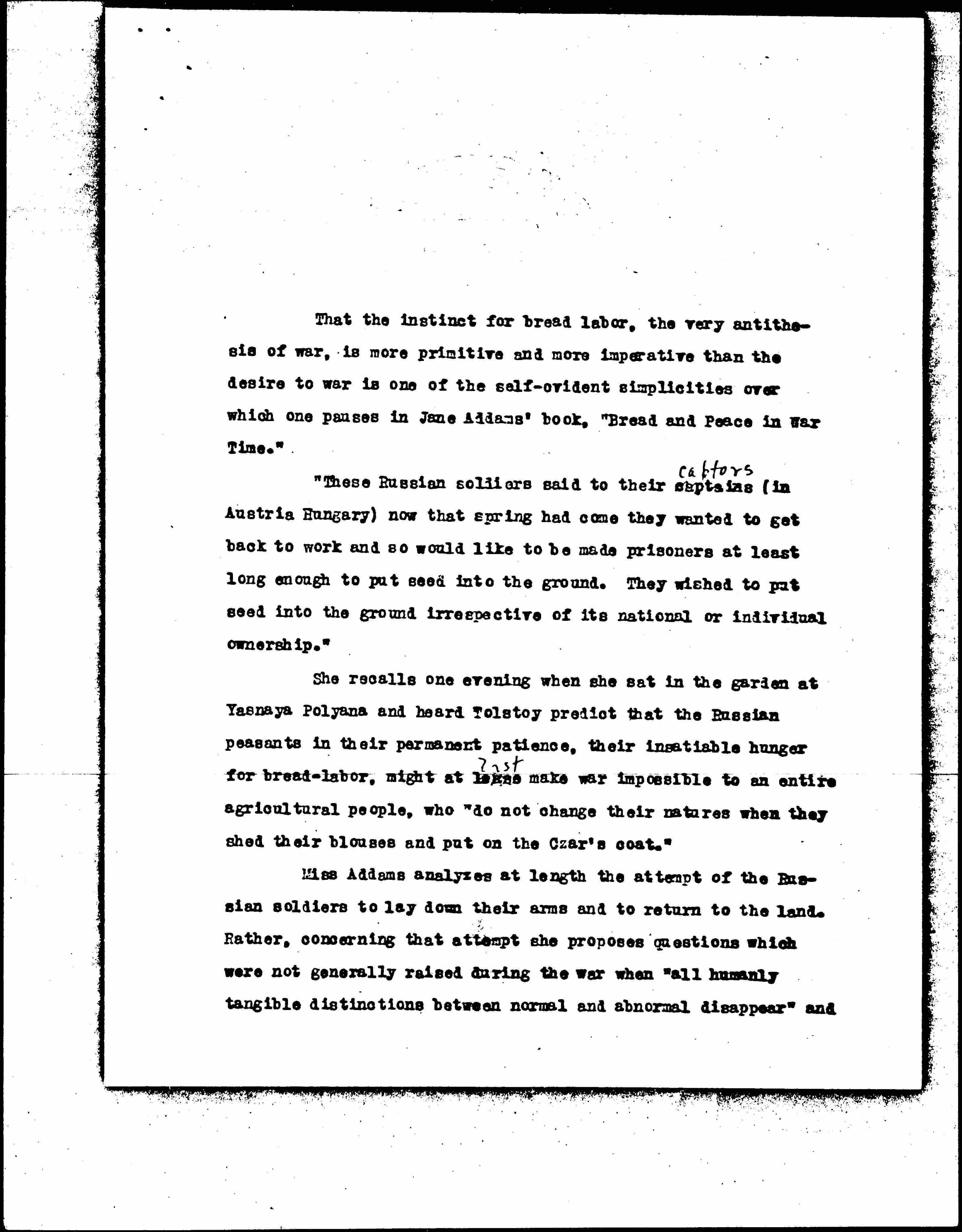






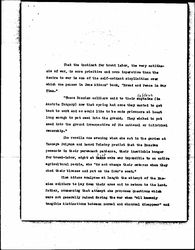
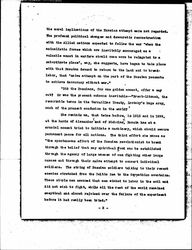
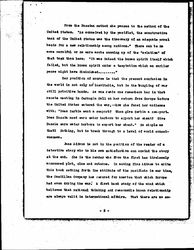
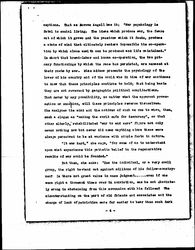
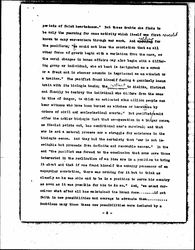
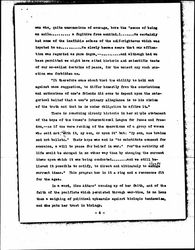
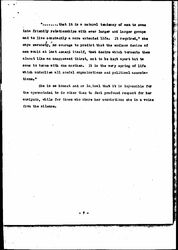













Comments